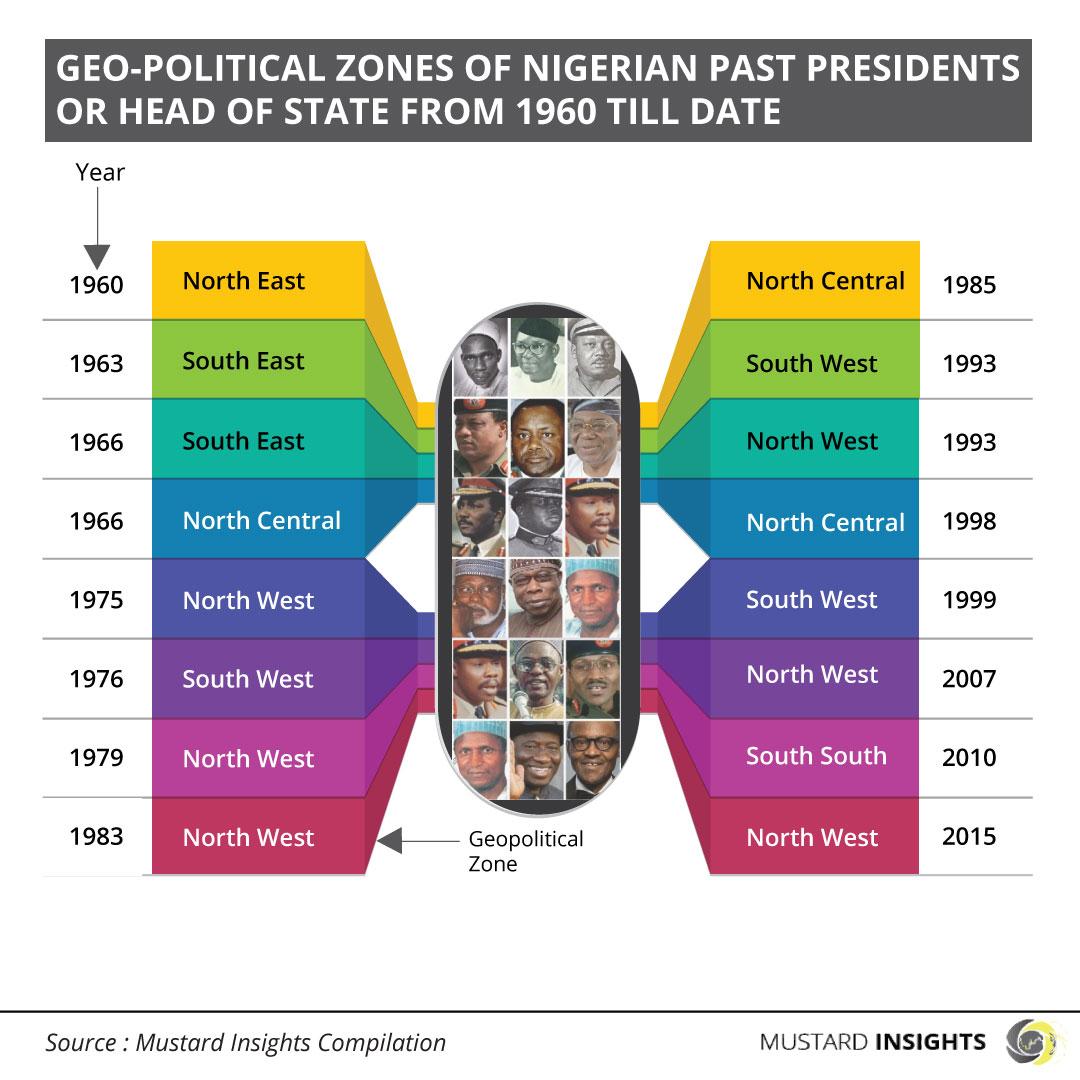Africa's largest economy - Nigeria, ranks 6 in Africa and 17 in the world on the group grievance index, which measures the division and schism between different groups based on social and political characteristics.

The politics of zoning continues to shape the anticipated general elections in Africa's largest economy - Nigeria. Essentially, the politics of zoning is a political practice in Nigeria under which political parties agree to split their presidential and vice-presidential candidates between the north and south of the country and also to alternate the home area of the president between the north and south of the country. Simply put, it is a method of 'we are the next to rule".
Predominantly, an average Nigerian is adjudged to view politics as a partisan or as an ethnicist. Nigeria ranks 6 in Africa and 17 in the world according to the global economy ranking on the group grievance index, which measures the division and schism between different groups based on social and political characteristics.
How did Nigeria get here?
The politics of zoning was first introduced in the Second Republic by the National Party of Nigeria after the Biafran Civilian War in 1967. The party's objectives are to ease interethnic tensions and give every Nigerian the opportunity to govern the nation. Afterwards, during General Sanni Abacha's military regime, some eminent leaders advocated for the rotation of power among the six geopolitical zones in the country; hence, there were serious considerations to adopt the system.
Which region rules the most?
1. North East - 1 (1960)
2. North Central - 3 (1966,1985, 1998)
3. South East - 2 (1963, 1966)
4. South West - 3 (1976, 1993, 1999)
5. North West - 6 (1975, 1979, 1983, 1993, 2007, 2015)
6. South South - 1 (2010)
Breakdown regimes/administrations by regions
- Nigeria became independent on Saturday, 1 October 1960 and the late Abubakar Tafewa Balewa an Indigene of Bauchi state, North-East Nigeria, became the first and only prime minister. Nnamdi Azikiwe an indigene of Enugu, South East Nigeria became the first ceremonial president in 1963.
- Aguiyi Ironsi an indigene of Umuahia, Eastern Nigeria, ruled as the first military government after a coup in 1966.
- Yakubu Gowon an indigene of Plateau, Northern Central Nigeria took over after a coup in 1966 to become the longest-serving head of state in Nigeria till date.
- The government of Gowon was toppled in July 29, 1975 and succeeded by another senior military officer, Murtala Muhammed, an indigene of Kano State, North-West Nigeria. He was assassinated on 13 February 1976, which led to the Supreme military council appointment of General Olusegun Obasanjo, an indigene of Ogun State, South-West Nigeria.
- In 1979, Shehu Shagari, an indigene of Kaduna State, North West Nigeria, took over as the first civilian leader to take office under the constitution by winning an election under the National Party of Nigeria. He was ousted by General Muhammed Buhari, an indigene of Kastina, North West Nigeria, through a coup d' etat in 1983.
- General Muhammadu Buhari was later overthrown by his Chief of Army Staff, General Ibrahim Babangida, an indigene of Niger State, North Central Nigeria, in a coup.
- In 1993, Babangida resigned from office after the event of June 12 elections annulment and appointed Ernest Shonekan, an indigene of Lagos state, South-West Nigeria as an interim National government and subsequently sworn in as the head of state. General Sanni Abacha an indigene of Kano, South-West Nigeria, overthrew the government of Shonekan three months after his administration in 1993.
- After the death of Abacha in 1998, he was succeeded by General Abdulsalam Abubakar, an indigene of Minna, North Central Nigeria and he handed over power back to the civilian government in 1999, which saw Olusegun Obasanjo sworn in as the president under the civilian regime.
- After eight years of leadership, another election took place in Nigeria and late Musa Yar’Adua an indigene of Kastina, North-West Nigeria, emerged as the president of the Federal Republic of Nigeria in 2007.
- After he died in 2010 due to an extended illness (reported to have received treatment for pericarditis), the vice-president, Goodluck Jonathan an indigene of Bayelsa, South South Nigeria took over for six years before losing the 2015 election to President Muhammed Buhari an indegene of Kastina, North West Nigeria.
Zoning in the 2023 election
While there is no provision for zoning in the 1999 Constitution of the Federal Republic of Nigeria and zoning is not part of the conditions for Nigeria’s presidency, the ideology of zoning and rotating power has found solid ground in Nigerian political arena, and will significantly shape the 2023 elections.
After the recent conclusion of the Presidential primaries, political parties are strategically planning to choose a presidential running mate (vice-president) and using the zoning principle to favor their ambitions and give them an edge in the coming elections.
As Nigeria moves closer to the 2023 general elections, there is so much disquiet over zoning and rotational presidency in the country.
Thoughts?
We won't share your email address. All fields are required.
